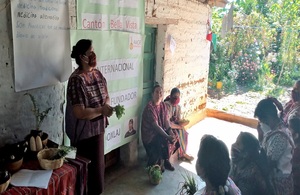Health volunteers in Quiche, Huehuetenango and Izabal trained with UK funds
120 Mayan women received training to become community health volunteers and strengthen COVID-19 resilience in three departments of Guatemala.

Communities in Quiché (Cunén), Huehuetenango (San Ildefonso Ixtahuacán), and Izabal (El Estor) benefited from this initiative launched together by the British Embassy and UK based NGO, AMOR. Total investment was more than 90,000 quetzals.
Community Health Volunteers held weekly clinics and conducted home visits to educate on COVID-19 prevention and about the prevention and treatment of other common diseases affecting indigenous communities. The programme included training in Mayan traditional medicine.
As part of the results of the project, the Health Volunteers reported an increase in confidence regarding their knowledge on traditional medicinal plants and first aider techniques. The project also evidenced that local authorities, including health centre staff, are eager to get involved in similar training opportunities.
In 2020, the UK committed up to £313 million of UK Aid to support research and development for vaccines, treatments and tests to ensure new tools against COVID-19 are available to all, including the world’s poorest countries.
In Guatemala, and as soon as the pandemic exploded, the UK invested in several projects aimed at tackling the impact of the COVID-19. Special assistance was also provided to help indigenous communities in Sololá to cover some of their basic food needs, and work with AGEXPORT to encourage municipalities to develop and implement COVID-19 protocols and economic reactivation.